Text

🚀 Why is SEO important for E-commerce websites? 📈
🚀 Boosting Visibility and Traffic: SEO (Search Engine Optimization) is crucial for E-commerce websites as it enhances online visibility, driving more organic traffic. Optimizing product pages with relevant keywords ensures better search engine rankings, attracting potential customers.
💡 Increased Credibility and Trust: Users tend to trust websites that appear higher in search results. SEO helps build credibility by optimizing content, improving user experience, and ensuring easy navigation, ultimately fostering trust among customers.
💰 Maximizing ROI: Effective SEO strategies result in a higher return on investment (ROI) for E-commerce businesses. By targeting the right audience and optimizing for relevant keywords, companies can reach potential customers who are more likely to convert into buyers.
🛒 Enhanced User Experience: SEO involves optimizing website structure and content, leading to an improved user experience. Easy navigation, fast loading times, and mobile-friendliness contribute to higher customer satisfaction, encouraging repeat visits and purchases.
In conclusion, SEO is the backbone of successful E-commerce, driving visibility, credibility, and a positive user experience, ultimately maximizing business potential. 🌐✨
💬 Share your thoughts: How has SEO impacted your business? Comment below! 👇😊
#ecommerceseo #ecommercewebsite #ecommerce #SEO #DigitalMarketing #OnlineVisibility #TargetedTraffic #Conversions #BusinessGrowth #MarketingStrategy #SearchEngineOptimization #ecommercesuccess #CompetitiveEdge #OnlinePresence #IncreaseVisibility #DriveTraffic #BoostRankings #BusinessSuccess #ChatGPT #aridradmx #AridraChandraDas
#seo#seo changbin#seonghwa#digitalmarketing#seo expert#seo company#seo services#digital marketing#seo marketing#searchengineoptimization
6 notes
·
View notes
Text

🚀 Embark on an Advanced E-commerce SEO Roadmap! 🛒
Welcome to the extraordinary journey of advanced e-commerce SEO, where we unravel the secrets to elevate your online store's visibility to new heights. This roadmap is your enchanted guide to mastering the art of search engine optimization and ensuring your digital kingdom thrives. Let's dive into the magical realms of keyword exploration, meta mastery, and user experience marvels.
🌐 Keyword Exploration: In the vast sea of keywords, discover hidden gems that seamlessly align with your products.
📊 Meta Masterpiece: Craft captivating meta tags and descriptions infused with schema markup for a delightful feast for search engines.
🛍️ User Experience Marvel: Enchant visitors with a mobile-friendly design and swift-loading pages, pleasing both customers and algorithms.
🗺️ Navigation Wizardry: Guide search engine bots effortlessly with dynamic XML sitemaps and breadcrumb trails, ensuring an efficient crawl through your digital kingdom.
🌐 Content Alchemy: Conjure up shareable, link-worthy content to strengthen your site's authority and captivate your audience with irresistible magic.
📈 Analytical Insight: Peer into the mystical world of analytics tools to fine-tune your performance and uncover hidden opportunities.
🚀 Social Media Enchantment: Dance gracefully on the social media stage, cultivating a vibrant community around your brand and spreading the enchantment far and wide.
With this advanced e-commerce SEO roadmap, your online store is poised for a symphony of success. Happy optimizing!
🚀🔍 💬 Share your thoughts: How has SEO impacted your business? Comment below! 👇😊
#seo #business #ecommerceseo #SEO #DigitalMarketing #OnlineVisibility #TargetedTraffic #Conversions #BusinessGrowth #MarketingStrategy #SearchEngineOptimization #StayAhead #CompetitiveEdge #OnlinePresence #IncreaseVisibility #DriveTraffic #BoostRankings #BusinessSuccess #ChatGPT #aridradmx #AridraChandraDas
#seo#seonghwa#digitalmarketing#seo services#seo company#seo changbin#seo expert#searchengineoptimization#seo marketing#digital marketing
2 notes
·
View notes
Text
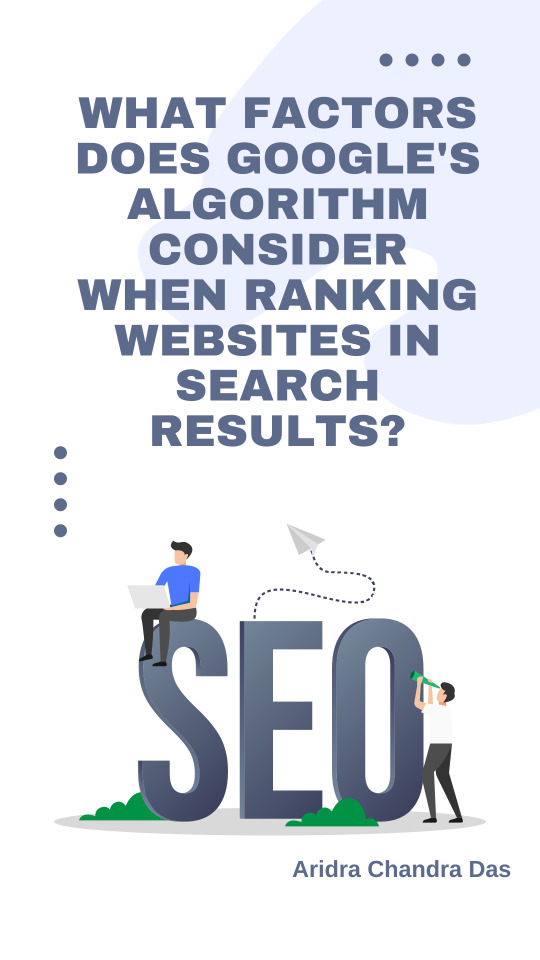
📈 What factors does Google's algorithm consider when ranking websites in search results? 🌐
🔍 Google's search algorithm uses numerous factors to rank websites in search results. Here are key considerations:
1. Content Quality: High-quality, relevant, and original content is essential.
2. Keywords: Keywords in titles, headers, and body text help Google understand the content.
3. Backlinks: The number and quality of links from other websites to yours play a crucial role.
4. User Experience: Easy navigation, mobile-friendliness, and quick page loading are vital.
5. Page Authority: The overall authority and trustworthiness of your site affect rankings.
6. User Engagement: Metrics like click-through rates and dwell time show user interest.
7. Freshness: Recent and updated content may get a ranking boost.
8. Local SEO: For local businesses, location signals are crucial.
9. Security: Secure websites (HTTPS) have a slight advantage.
10. Social Signals: Social media activity may influence rankings.
11. Page Metadata: Descriptive titles and meta descriptions help click-through rates.
12. Page Speed: Fast-loading pages enhance user experience.
13. Relevance: How closely your content matches a user's search query.
Remember, Google's algorithm is complex and evolving, so staying updated on SEO best practices is essential for website owners. 🚀💻📈
💬 Share your thoughts: How has SEO impacted your business? Comment below! 👇😊
#seo#business#opportunity#digital#comment#share#SEO#DigitalMarketing#OnlineVisibility#TargetedTraffic#Conversions#BusinessGrowth#MarketingStrategy#SearchEngineOptimization#StayAhead#CompetitiveEdge#OnlinePresence#IncreaseVisibility#DriveTraffic#BoostRankings#BusinessSuccess#ChatGPT#aridradmx#AridraChandraDas
#seo#seonghwa#digitalmarketing#seo company#seo services#seo expert#seo changbin#digital marketing#searchengineoptimization#seo marketing
1 note
·
View note
Text
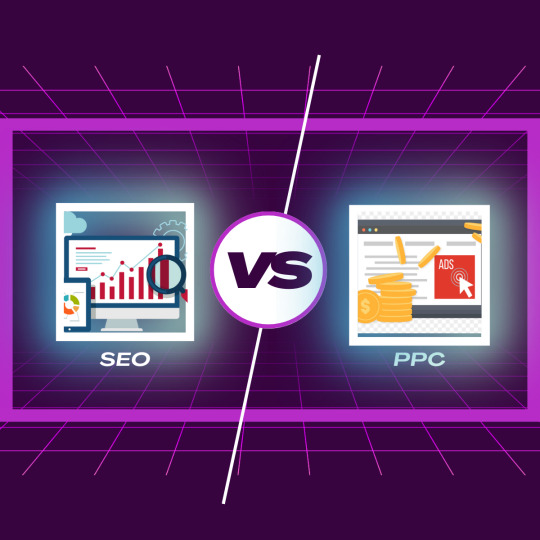
📈 Why SEO is better than PPC? 💰
SEO 🌐 and PPC 💰 are two essential digital marketing strategies, each with its advantages. However, here's why SEO often takes the cake 🍰:
Long-Term Results 📈: SEO builds a sustainable online presence. Once you rank well, you can enjoy organic traffic without constant ad spend.
Cost-Effective 🤑: While PPC demands ongoing budgets, SEO's initial investment can provide ongoing benefits.
Credibility and Trust 🏆: High organic rankings often earn trust from users, as they perceive organic results as more reliable than paid ads.
Broader Reach 🌍: SEO targets a wider audience, as it doesn't rely on specific keywords or demographics like PPC.
Ad-Block Resistant 🚫: As ad-blockers become more common, SEO remains unaffected, ensuring visibility to all users.
Local Optimization 🏙️: For businesses targeting local customers, SEO can improve visibility in local searches without PPC expenses.
In conclusion, SEO offers long-lasting, cost-effective, and trust-building benefits that make it a preferred choice for many businesses. PPC, while valuable, may require a higher budget and offers short-term gains. Combining both strategies can create a robust digital marketing mix 📊.
💬 Share your thoughts: How has SEO impacted your business? Comment below! 👇😊
#seo #business #opportunity #digital #comment #share #SEO #DigitalMarketing #OnlineVisibility #TargetedTraffic #Conversions #BusinessGrowth #MarketingStrategy #SearchEngineOptimization #StayAhead #CompetitiveEdge #OnlinePresence #IncreaseVisibility #DriveTraffic #BoostRankings #BusinessSuccess #ChatGPT #aridradmx #AridraChandraDas
#seo services#seonghwa#digitalmarketing#seo company#seo expert#seo marketing#seo changbin#digital marketing#searchengineoptimization#seo
0 notes
Text

🔰Professional SEO Expert with Advanced SEO Strategy. Doing SEO for every CMS like Shopify, WordPress, Wix, Squarespace, and Blogger.
Aridra Chandra Das | White Hat SEO Expert
0 notes
Text
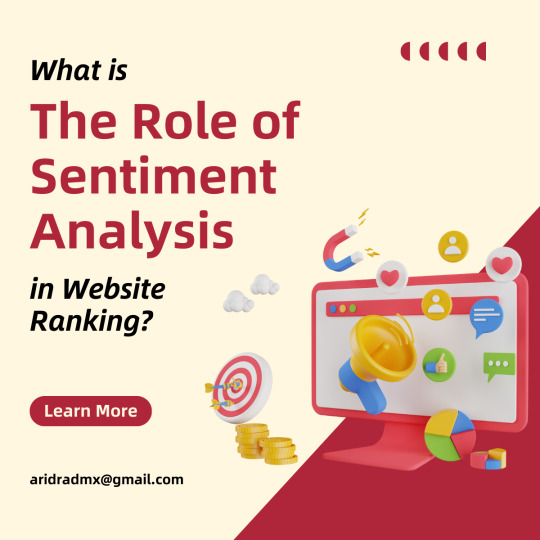
📈 What is The Role of Sentiment Analysis in Website Ranking? 🌐
Sentiment analysis 📊 plays a crucial but indirect role in website ranking algorithms. Search engines like Google aim to deliver the most relevant and valuable content to users. Sentiment analysis helps in this by gauging the emotional tone of website content.
User Engagement: Positive sentiment in content often leads to better user engagement, like longer time spent on a page and lower bounce rates. Google interprets this as a signal that the content is valuable, potentially improving the site's ranking.
Social Signals: Content with positive sentiment tends to get more shares, likes, and comments on social media platforms. These social signals indirectly impact ranking by increasing a website's visibility and credibility.
User Experience: Sentiment analysis can reveal areas of improvement in website content. If a page receives negative sentiment, it may indicate issues with the user experience or content quality, which can be addressed to boost rankings.
Competitive Advantage: Understanding sentiment allows websites to tailor their content to audience preferences, gaining a competitive edge.
In conclusion, while sentiment analysis itself doesn't directly influence website rankings, its impact on user behavior, social signals, and content quality indirectly plays a vital role in determining a website's position in search engine results. 😊🚀
💬 Share your thoughts: How has SEO impacted your business? Comment below! 👇😊
#seo #business #opportunity #digital #comment #share #SEO #DigitalMarketing #OnlineVisibility #TargetedTraffic #Conversions #BusinessGrowth #MarketingStrategy #SearchEngineOptimization #StayAhead #CompetitiveEdge #OnlinePresence #IncreaseVisibility #DriveTraffic #BoostRankings #BusinessSuccess #ChatGPT #aridradmx #AridraChandraDas
#seo#seonghwa#seo services#searchengineoptimization#digital marketing#seo company#seo expert#seo marketing#digitalmarketing#seo changbin
0 notes
Text
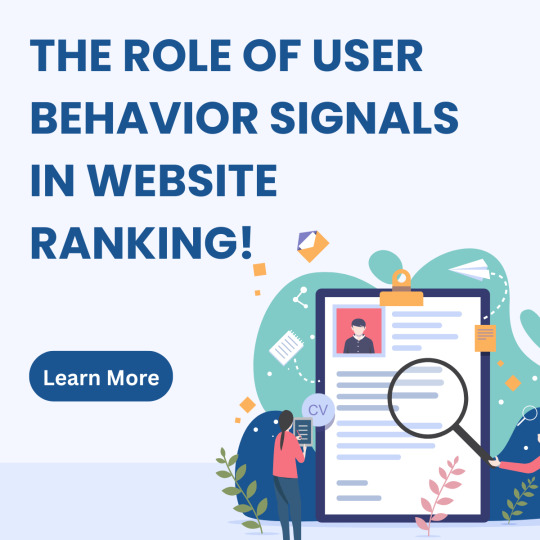
📈 The Role of User Behavior Signals in Website Ranking! 🌐
User behavior signals play a crucial role in determining a website's ranking in search engine results. These signals provide search engines like Google with valuable insights into how users interact with a website, helping them evaluate its quality and relevance. Here's a brief breakdown:
🧐 Click-Through Rate (CTR): High CTR indicates that users find your content appealing, which can boost your ranking.
⏱️ Dwell Time: The longer users stay on your site, the better. It signals that your content is engaging and informative.
📝 Bounce Rate: Low bounce rates suggest that visitors are finding what they need on your site, enhancing your credibility.
🔗 Internal Linking: Effective internal links can guide users through your content, increasing their engagement and satisfaction.
🗣️ User Feedback: Positive reviews and comments improve your website's reputation, while negative feedback can have the opposite effect.
📱 Mobile Friendliness: User-friendly mobile experiences are prioritized since mobile searches are prevalent.
In summary, user behavior signals are like a website's report card. Search engines use them to assess user satisfaction, which ultimately impacts your ranking. Prioritizing user experience is essential for better search engine visibility. 🚀
💬 Share your thoughts: How has SEO impacted your business? Comment below! 👇😊
#seo #business #opportunity #digital #comment #share #SEO #DigitalMarketing #OnlineVisibility #TargetedTraffic #Conversions #BusinessGrowth #MarketingStrategy #SearchEngineOptimization #StayAhead #CompetitiveEdge #OnlinePresence #IncreaseVisibility #DriveTraffic #BoostRankings #BusinessSuccess #ChatGPT #aridradmx #AridraChandraDas
#seo changbin#seo#digital marketing#seo services#seo company#seo marketing#seo expert#seonghwa#digitalmarketing#searchengineoptimization
1 note
·
View note
Text

🌐 How can you optimize your website's architecture for better ranking? 🚀
🚀 Optimizing your website's architecture is crucial for better search engine rankings. Here are some tips to help you achieve this:
🏗 Organize Your Content: Create a clear and logical hierarchy for your website. Use categories and subcategories to group related content. This makes it easier for both users and search engines to navigate your site.
📄 Create SEO-Friendly URLs: Use descriptive URLs that include keywords. Avoid long, complex URLs with unnecessary parameters.
🧹 Remove Duplicate Content: Duplicate content can confuse search engines. Regularly audit your site and use canonical tags to specify the preferred version of a page.
🚄 Improve Page Loading Speed: Faster websites rank higher. Compress images, minimize code, and use browser caching to boost your site's speed.
🧐 Mobile Optimization: Ensure your site is responsive and mobile-friendly. Google prioritizes mobile indexing.
🔗 Internal Linking: Link relevant pages within your site to improve user experience and distribute link authority.
🧬 Schema Markup: Implement schema markup to enhance search engine understanding of your content.
🕵️ Keyword Research: Use relevant keywords in your content and meta tags, but avoid keyword stuffing.
📈 Regular Updates: Keep your content fresh and up-to-date to show search engines that your site is active and relevant.
🤖 XML Sitemap: Create and submit an XML sitemap to search engines for better indexing.
By following these tips, you can create a well-structured website that not only ranks higher but also provides an excellent user experience. 🌐📊👨💻
💬 Share your thoughts: How has SEO impacted your business? Comment below! 👇😊
#seo #business #opportunity #digital #comment #share #SEO #DigitalMarketing #OnlineVisibility #TargetedTraffic #Conversions #BusinessGrowth #MarketingStrategy #SearchEngineOptimization #StayAhead #CompetitiveEdge #OnlinePresence #IncreaseVisibility #DriveTraffic #BoostRankings #BusinessSuccess #ChatGPT #aridradmx #AridraChandraDas
#seo changbin#seonghwa#digitalmarketing#seo company#seo expert#seo marketing#seo services#digital marketing#searchengineoptimization#seo
0 notes
Text
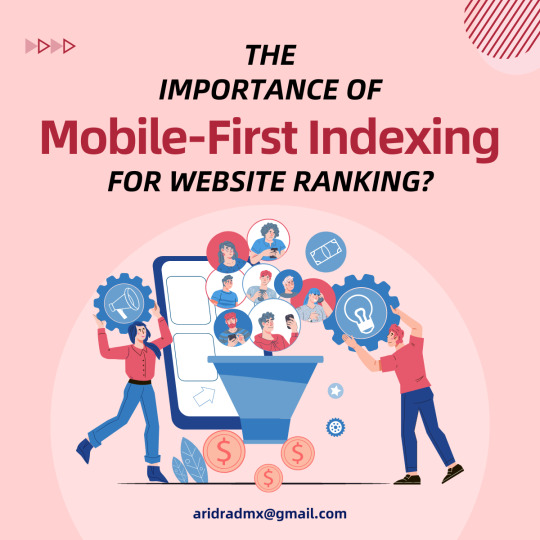
🌐 What is the Importance of Mobile-First Indexing for Website Ranking? 🚀
Mobile-first indexing is 🔑 crucial for website ranking 📈 in today's digital landscape. 🌐 It means search engines primarily use the mobile version of your site for ranking and indexing. Here's why it matters:
📱 User-Centric Approach: With most internet traffic coming from mobile devices, a mobile-first approach ensures a better user experience, reducing bounce rates and keeping visitors engaged.
⚙️ SEO Benefits: Google prioritizes mobile-friendly sites, giving them higher rankings. Failure to optimize for mobile can lead to a drop in search engine rankings.
📈 Improved Visibility: Mobile-friendly sites are more likely to appear in mobile search results, increasing your website's visibility to a broader audience.
🚀 Faster Loading Times: Mobile optimization often results in faster loading speeds, which is a critical factor for SEO and user satisfaction.
📊 Competitive Edge: Mobile-first indexing keeps your site competitive in the ever-evolving digital landscape.
To succeed in SEO and maintain a strong online presence, embracing mobile-first indexing is a must. 📱💪
💬 Share your thoughts: How has SEO impacted your business? Comment below! 👇😊
#seo #business #opportunity #digital #comment #share #SEO #DigitalMarketing #OnlineVisibility #TargetedTraffic #Conversions #BusinessGrowth #MarketingStrategy #SearchEngineOptimization #StayAhead #CompetitiveEdge #OnlinePresence #IncreaseVisibility #DriveTraffic #BoostRankings #BusinessSuccess #ChatGPT #aridradmx #AridraChandraDas
#seo services#seonghwa#digitalmarketing#seo expert#seo company#seo marketing#seo changbin#digital marketing#seo#searchengineoptimization
0 notes
Text
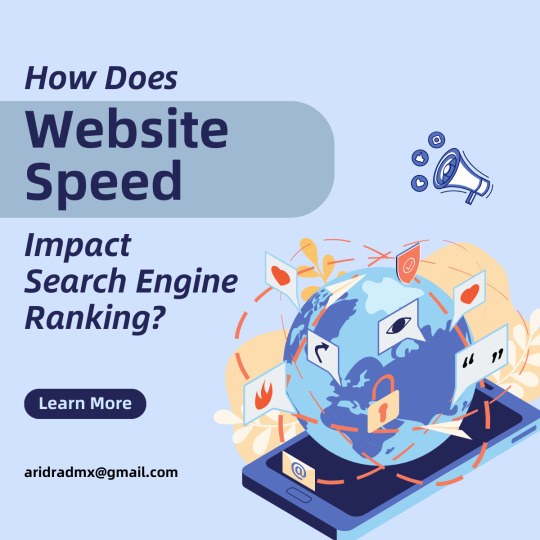
🌐 How does Website Speed impact Search Engine Ranking? 🚀
Website speed 🚀 significantly impacts search engine ranking 📈. Search engines like Google prioritize user experience, and a fast-loading website contributes to a positive user experience. Here's how it works:
Improved User Experience 😃: Fast-loading pages keep visitors engaged, reducing bounce rates. A slow website frustrates users and increases bounce rates, signaling to search engines that your site may not be valuable.
Mobile Friendliness 📱: Mobile users expect speed. A slow mobile site can result in lower rankings, as Google prioritizes mobile-friendly sites.
Crawlability 🕷️: Search engine bots crawl faster on speedy sites, ensuring your content gets indexed promptly.
Page Ranking 🔝: Google's algorithm considers site speed as a ranking factor. Faster websites tend to rank higher in search results.
Core Web Vitals ⚙️: Google uses Core Web Vitals, including loading speed, for ranking assessment. Slow websites may be penalized.
In summary, a fast website leads to better user engagement, mobile compatibility, and search engine rankings. Make speed optimization a priority to boost your online presence! 🌟
💬 Share your thoughts: How has SEO impacted your business? Comment below! 👇😊
#seo #business #opportunity #digital #comment #share #SEO #DigitalMarketing #OnlineVisibility #TargetedTraffic #Conversions #BusinessGrowth #MarketingStrategy #SearchEngineOptimization #StayAhead #CompetitiveEdge #OnlinePresence #IncreaseVisibility #DriveTraffic #BoostRankings #BusinessSuccess #ChatGPT #aridradmx #AridraChandraDas
#seo changbin#seo services#digitalmarketing#seo company#seonghwa#seo expert#seo#digital marketing#seo marketing#searchengineoptimization
0 notes
Text
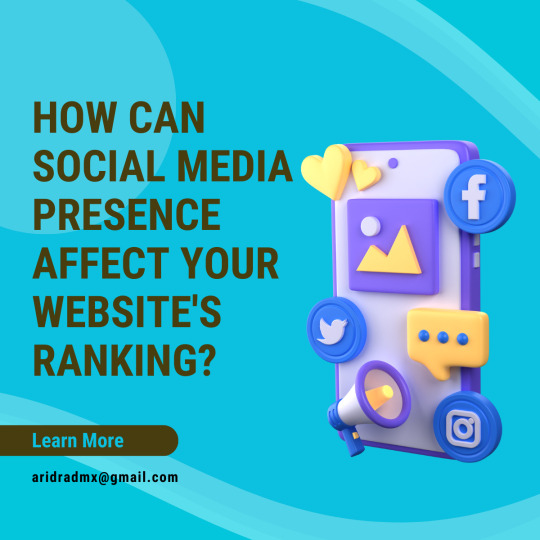
📈 How Social Media Presence Impacts Website Ranking 📊
Your website's ranking on search engines like Google is influenced by several factors, and your social media presence is one of them. Here's how it works:
1️⃣ Increased Web Traffic: Sharing your website content on social media platforms can drive more traffic. Search engines like Google consider user engagement and traffic as ranking factors.
2️⃣ Quality Backlinks: Social media can help you acquire backlinks from reputable sources. When others share your content, it can improve your website's authority and search engine rankings.
3️⃣ Brand Visibility: Active social media accounts contribute to brand awareness. If users recognize your brand through social media, they're more likely to click on your website in search results.
4️⃣ Social Signals: Search engines monitor social signals, such as likes, shares, and comments. These signals indicate content popularity, which can positively impact ranking.
5️⃣ Content Promotion: Social media platforms are ideal for promoting new content. Sharing updates can lead to quicker indexing by search engines.
In summary, maintaining a robust social media presence can enhance your website's ranking by driving traffic, building backlinks, boosting brand visibility, signaling content popularity, and aiding content promotion. 🚀 So, don't underestimate the power of social media in your SEO strategy.
💬 Share your thoughts: How has SEO impacted your business? Comment below! 👇😊
#seo #business #opportunity #digital #comment #share #SEO #DigitalMarketing #OnlineVisibility #TargetedTraffic #Conversions #BusinessGrowth #MarketingStrategy #SearchEngineOptimization #StayAhead #CompetitiveEdge #OnlinePresence #IncreaseVisibility #DriveTraffic #BoostRankings #BusinessSuccess #ChatGPT #aridradmx #AridraChandraDas
#seo changbin#seo services#digitalmarketing#seo company#seonghwa#seo expert#seo#digital marketing#seo marketing#searchengineoptimization
1 note
·
View note
Text
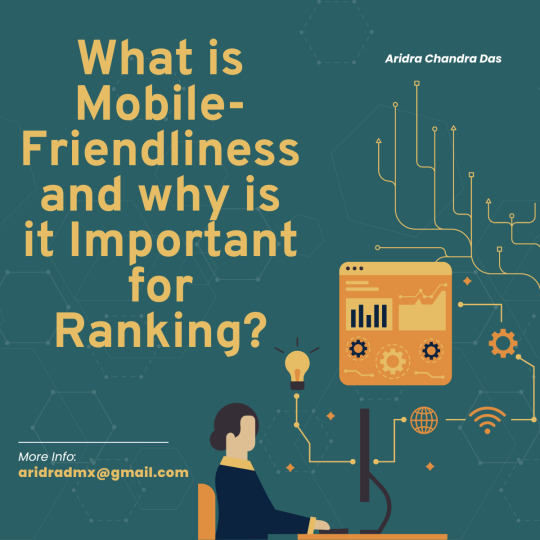
🌐 What is Mobile-Friendliness and why is it Important for Ranking? 🚀
Mobile-Friendliness: 📱 Why It Matters for SEO Rankings
Mobile-friendliness refers to a website's ability to perform effectively and provide a seamless user experience on mobile devices like smartphones and tablets. This concept has gained paramount importance in recent years, primarily due to the widespread use of mobile devices for internet browsing.
🔑 Importance for Ranking:
User Experience: Google prioritizes user experience. A mobile-friendly site ensures that visitors can easily navigate, read content, and interact with the site, leading to longer visits and lower bounce rates.
Ranking Signals: Google's algorithms consider mobile-friendliness as a ranking factor. Websites optimized for mobile are more likely to rank higher in search results, increasing their visibility to potential visitors.
Mobile-First Indexing: Google now predominantly uses the mobile version of a site for indexing and ranking. If your site isn't mobile-friendly, it may be at a disadvantage in search rankings.
In summary, mobile-friendliness is crucial for SEO success. Ensuring your website is mobile-responsive can enhance user satisfaction and boost your rankings on search engine results pages. 🚀
💬 Share your thoughts: How has SEO impacted your business? Comment below! 👇😊
#seo #business #opportunity #digital #comment #share #SEO #DigitalMarketing #OnlineVisibility #TargetedTraffic #Conversions #BusinessGrowth #MarketingStrategy #SearchEngineOptimization #StayAhead #CompetitiveEdge #OnlinePresence #IncreaseVisibility #DriveTraffic #BoostRankings #BusinessSuccess #ChatGPT #aridradmx #AridraChandraDas
#seo services#seo changbin#digitalmarketing#seo company#seo#seonghwa#searchengineoptimization#seo marketing#seo expert#digital marketing
3 notes
·
View notes
Text

🌐 How do you choose the right keywords for your website? 🚀
Choosing the right keywords for your website is 🔑 to driving organic traffic and improving your site's visibility on search engines like Google. Here's a simple guide to help you get started! 🚀
1. Research: Begin by researching your niche and target audience. Identify common words and phrases they use when searching for content related to your website.
2. Keyword Tools: Utilize keyword research tools like Google Keyword Planner, SEMrush, or Ahrefs. These tools provide insights into search volume, competition, and related keywords.
3. Long-Tail Keywords: Consider using long-tail keywords, which are specific phrases with lower competition. They often lead to more qualified traffic.
4. Relevance: Ensure your chosen keywords align with your website's content and user intent. Avoid stuffing unrelated keywords.
5. Competitor Analysis: Analyze your competitors' keyword strategies to identify opportunities and gaps.
6. Keyword Variations: Use a mix of singular and plural forms, synonyms, and variations of your chosen keywords.
7. User Experience: Prioritize user experience. Your content should be valuable and informative, not just focused on keywords.
8. Track and Adjust: Regularly monitor your keyword performance and adjust your strategy based on results.
By following these steps and staying updated on SEO trends, you'll be on your way to selecting the perfect keywords for your website! 🌐🔍💼
💬 Share your thoughts: How has SEO impacted your business? Comment below! 👇😊
#seo #business #opportunity #digital #comment #share #SEO #DigitalMarketing #OnlineVisibility #TargetedTraffic #Conversions #BusinessGrowth #MarketingStrategy #SearchEngineOptimization #StayAhead #CompetitiveEdge #OnlinePresence #IncreaseVisibility #DriveTraffic #BoostRankings #BusinessSuccess #ChatGPT #aridradmx #AridraChandraDas
#seo services#seonghwa#digitalmarketing#seo company#seo expert#seo marketing#seo changbin#searchengineoptimization#digital marketing#seo
0 notes
Text
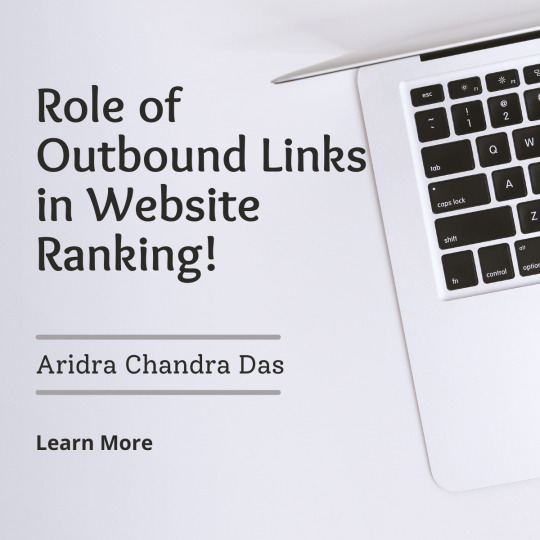
🌐 Role of Outbound Links in Website Ranking! 🚀
Outbound links, also known as external links, are an essential component of a website's SEO strategy. These links direct visitors from your website to external web pages. Here's why outbound links matter in website ranking:
1. Credibility and Authority: Outbound links to reputable sources signal to search engines that your content is well-researched and trustworthy. This can positively impact your website's authority and rankings.
2. User Experience: Outbound links can enhance the user experience by providing additional information and resources. Happy users are more likely to stay longer on your site, reducing bounce rates, which can boost your ranking.
3. Relevance: Linking to relevant, high-quality websites can improve the context of your content, making it more understandable and informative for your audience.
4. Networking: Outbound links can help you build relationships with other websites in your niche, potentially leading to backlinks, which are crucial for SEO.
However, it's vital to strike a balance. Overloading your content with outbound links can be detrimental. Ensure that links are relevant, add value to your content, and are not used for spammy purposes. 📈✨
💬 Share your thoughts: How has SEO impacted your business? Comment below! 👇😊 #seo #business #opportunity #digital #comment #share #SEO #DigitalMarketing #OnlineVisibility #TargetedTraffic #Conversions #BusinessGrowth #MarketingStrategy #SearchEngineOptimization #StayAhead #CompetitiveEdge #OnlinePresence #IncreaseVisibility #DriveTraffic #BoostRankings #BusinessSuccess #ChatGPT #aridradmx #AridraChandraDas
#searchengineoptimization#seo changbin#seonghwa#digitalmarketing#seo company#seo expert#seo#digital marketing#seo marketing#seo services
0 notes
Text

📈 Boost Your Website Ranking with Guest Posting! 🚀
Guest posting is a powerful strategy to elevate your website's ranking 🌟. It involves creating content for other websites within your niche and linking back to your site. Here's how you can harness the magic of guest posting to climb the search engine rankings:
1. Research: 🔍 Find websites in your niche that accept guest posts. Look for high-quality, reputable sites with a strong online presence.
2. Quality Content: 📝 Craft valuable, well-researched content that resonates with the target audience. Ensure it's original and engaging.
3. Strategic Links: 🔗 Insert relevant links back to your website within the guest post. This helps improve your site's authority and SEO.
4. Build Relationships: 🤝 Foster relationships with bloggers and site owners in your niche. Networking can lead to more guest posting opportunities.
5. Consistency: 🔄 Keep guest posting regularly to maintain a steady flow of backlinks.
6. Monitor Results: 📊 Track the impact of guest posting on your website's ranking using tools like Google Analytics.
By consistently following these steps, you'll not only improve your website's ranking but also establish your authority in your industry. Start guest posting today and watch your website soar in search engine results! 🚀🌐
💬 Share your thoughts: How has SEO impacted your business? Comment below! 👇😊
#seo #business #opportunity #digital #comment #share #SEO #DigitalMarketing #OnlineVisibility #TargetedTraffic #Conversions #BusinessGrowth #MarketingStrategy #SearchEngineOptimization #StayAhead #CompetitiveEdge #OnlinePresence #IncreaseVisibility #DriveTraffic #BoostRankings #BusinessSuccess #ChatGPT #aridradmx #AridraChandraDas
#seo changbin#seonghwa#seo#seo company#digitalmarketing#seo services#searchengineoptimization#digital marketing#seo expert#seo marketing
1 note
·
View note
Text

📈 How do you handle duplicate content to avoid ranking issues? 🚀
Managing duplicate content is vital to maintaining a healthy SEO ranking 🚀. Duplicate content refers to identical or substantially similar content appearing on multiple web pages within your site or across different websites. Here's how to tackle it effectively:
1. Canonical Tags: Use canonical tags to indicate the preferred version of a page. Search engines will prioritize this page for indexing.
2. 301 Redirects: Redirect duplicate URLs to the original, ensuring users and search engines are directed to the right content.
3. Unique Meta Titles and Descriptions: Craft unique titles and meta descriptions for each page to distinguish them in search results.
4. Consolidate Similar Pages: Combine similar content into one comprehensive page, reducing duplication.
5. Noindex Tags: For non-essential duplicate content like print versions or archive pages, use noindex tags to prevent indexing.
6. Internal Linking: Maintain a clear internal linking structure to guide search engines to the preferred page.
7. Syndication Care: If syndicating content, use rel="canonical" or noindex tags to prevent penalties.
8. Regular Audits: Continuously monitor for duplicate content using SEO tools.
Handling duplicate content is crucial to avoid ranking issues and maintain a strong online presence. Keep these strategies in mind to enhance your website's SEO performance! 📈👍
💬 Share your thoughts: How has SEO impacted your business? Comment below! 👇😊
#seo #business #opportunity #digital #comment #share #SEO #DigitalMarketing #OnlineVisibility #TargetedTraffic #Conversions #BusinessGrowth #MarketingStrategy #SearchEngineOptimization #StayAhead #CompetitiveEdge #OnlinePresence #IncreaseVisibility #DriveTraffic #BoostRankings #BusinessSuccess #ChatGPT #aridradmx #AridraChandraDas
#seo changbin#seo services#searchengineoptimization#digital marketing#digitalmarketing#seo#seo company#seo expert#seo marketing#seonghwa
0 notes
Text

📈 Relationship between Website Ranking and User Trust 🚀
The relationship between website ranking and user trust is like a 🏆 and a 🤝 handshake in the digital world. When a website ranks high on search engines like Google, it gains visibility and credibility. Users tend to trust and click on the top results, believing them to be more relevant and reliable. 🌐
This trust is built on several factors:
1. Relevance: High-ranking websites are often seen as more relevant to users' queries, making them a trustworthy source of information.
2. Authority: Search engines use complex algorithms to determine ranking. A high-ranking site is seen as an authoritative voice in its niche.
3. Quality: Websites that rank well often have user-friendly designs, quick load times, and well-structured content. This enhances the user experience and fosters trust.
4. Security: Secure websites (with HTTPS) rank better and are perceived as safer for users to interact with, reinforcing trust.
5. Consistency: Consistently high-ranking websites demonstrate reliability, which fosters long-term trust among users.
In summary, website ranking and user trust are closely intertwined. A higher rank often translates to higher user trust, but it's essential to maintain quality, relevance, and security to preserve that trust. 🌟
💬 Share your thoughts: How has SEO impacted your business? Comment below! 👇😊 #seo #business #opportunity #digital #comment #share #SEO #DigitalMarketing #OnlineVisibility #TargetedTraffic #Conversions #BusinessGrowth #MarketingStrategy #SearchEngineOptimization #StayAhead #CompetitiveEdge #OnlinePresence #IncreaseVisibility #DriveTraffic #BoostRankings #BusinessSuccess #ChatGPT #aridradmx #AridraChandraDas
#digital marketing#seo services#seonghwa#digitalmarketing#seo company#seo expert#seo changbin#searchengineoptimization#seo#seo marketing
0 notes